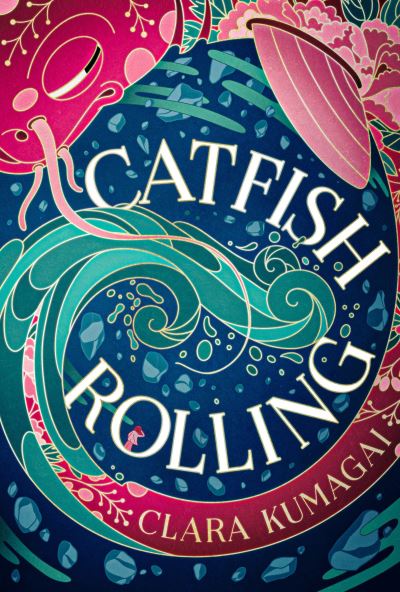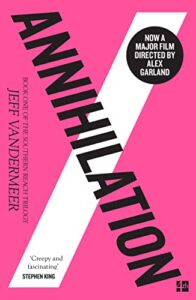
Ruth Ennis talks with Clara Kumagai, author of Catfish Rolling, about myth, time, and navigating the debut experience
by Ruth Ennis
What drew you to create a world with such an intricate relationship with time?
The Tōhoku earthquake in 2011 was so big that it shifted the earth on its axis and the earth now spins faster; our year is this tiny fraction of a second faster. When I learned this, I thought about how science can sound like sci-fi or magic, it’s almost unbelievable. It feels like something fantastical.
As that idea was taking hold in my mind, I was thinking about how time can be a bit funny around grief and trauma. It can feel like you’re stuck in a moment, or something that happened years ago can feel like it was just yesterday. Those states can change, grief doesn’t have a trajectory. The idea of time in relation to a person was important to me; how we perceive time, how we feel it, talk about it, experience it.
The Tōhoku earthquake in 2011 was so big that it shifted the earth on its axis and the earth now spins faster
I was visiting Fukushima Prefecture where there are exclusion zones where people can’t go because of radioactive effects of the Tōhoku nuclear power plant. Those places are interesting and eery to visit because it’s like people just left. You can see clothes hanging on a line. There are buildings totally overrun by vegetation.
It’s really interesting place, to see how it decayed and how time has affected it. All of those elements came together. It sounds like it grew together easily but really the information came at different times.

“A few years ago Sora lost her mother in an earthquake that devastated the community, but also fractured the movement of time. Now, certain areas across the country experience time slightly slower or faster than regular time. Sora and her father grow obsessed with understanding this strange phenomenon, dedicating their lives to researching it to the detriment of her father’s health and their relationship with each other.” —Ruth Ennis
How does myth inform the novel?
I love myth and folktales and fairytales. For me, when you’re adapting or retelling a myth, it’s about how you can make it more relevant to today. It’s about making it relevant to your character and the story you want to tell.
The myth functions nicely as a representation of something that is real or terrifying or forceful in a different way
A lot of it is metaphorical. I used Namazu so I could have a creature to cause these earthquakes, but it’s also representing how the earth is alive and is something people can’t control. Sora focuses a lot of her anger on this, she needs somewhere to project it on to. She is, in some ways, angry at nature.
The myth functions nicely as a representation of something that is real or terrifying or forceful in a different way. Myth is so compressed, and so looking at it from a different angle or with fresh eyes or digging into it a bit more can really draw it out in so many ways.
What was your favourite scene to write?
I enjoyed writing any scenes in the zones. They were such interesting, fluid, strange places where I felt the magical realism could really come in. Unfortunately, not all of them made it into the book, I had to mush some scenes together.
There are some scenes where Sora and Maya are looking for Sora’s father deeper and deeper into the zones, where they are getting more overgrown. I wouldn’t say I’m necessarily someone who enjoys writing settings but I enjoyed writing those and could feel like I was there.
I was reading Annihilation by Jeff VanderMeer and it’s extremely unnerving. While I don’t think my book is as terrifying as that, it was some inspiration for the zone settings being alive or conscious, and how the setting can become a character.
What advice would you give to emerging writers as they navigate the publication of their first book?
I’m still navigating the publication of my first book! I think community is super important. Especially in Ireland, it’s so easy to find and meet people. The Irish literary scene is, overall, really quite welcoming. I was at West Cork Literary Festival recently and it was easy to talk to people and find things in common.
Other authors have been so generous with their time and advice and I felt like I could ask them questions, like “is this a normal thing to do?” And now if people asked me questions, I’d say “yeah, let’s talk about it!” Reaching out is important and nine times out of ten they’ll give you an answer.
The Irish literary scene is, overall, really quite welcoming
Organisations like Children’s Books Ireland, The Irish Writer’s Centre, and The Society of Children’s Book Writers and Illustrators are worth joining for the resources. They’re set up to help and support you.
Publishing can have gate-keeping and underrepresented groups can experience that especially, but there are places you can find support around that. Writers know how hard it can be to get published. You need to have a sense of value in your own work, so there’s not a feeling of gratitude at any opportunity that appears to new writers—you don’t have to say you’re lucky.
Why was duality important for you to write about in this story?
A great question. I don’t think Sora is like me, not at all. But obviously her being multiracial is similar to me; she Japanese-Canadian, I’m Japanese-Irish but I was born in Canada. I wanted to write a character like her because I didn’t see characters like that when I was growing up. Irish young adult literature is having a great moment, and I think that’s because we’re seeing a lot more diversity. It was important to have a character to embody that.
A lot of people who are multiracial are like “am I more of one thing or another, what do I consider myself to be?” There are a lot of projections as to what other people think you are. It’s a complicated thing to think about, find an answer for, and then convey to other people. That’s a lifelong question you are finding answers to.
Irish young adult literature is having a great moment, and I think that’s because we’re seeing a lot more diversity
Obviously for YA, your character is going through all these changes – that’s why I like it so much, it’s so rich in times of change and figuring out your identity. Regarding the other elements – location, sexuality, age – I wanted to explore them because I wanted to show how it’s not necessarily about choosing one or the other. That duality is where you can find a middle, or a mixture of things where the balance changes at different times.
Something I don’t love in stories is when good or bad is something very clear. I wanted that duality to show how you can move between them and make something for yourself. I also didn’t want to label Sora’s sexuality. Obviously she’s queer, but I wanted to leave it free because she’s going to work that out and I don’t think you need to end with an answer. I just wanted room for all those elements.
How did your previous work inform Catfish Rolling?
It’s interesting, because all of that is short fiction and personal essays, right? I hadn’t thought about how it informed Catfish, except for how any writing you do informs whatever else you write. It’s all about learning.
Something amazing about working with different publications is that it lets you work with different editors. You see different editing styles, sometimes very detailed, sometimes very hands-off. It’s a great way to experience publishing something. It’s good to work up from short stories to something bigger like a novel. Getting rejected is also an important experience.
For YA there has to be a sense of hope and earnestness, you can’t have any air of condescension
I don’t really see a difference in my writing style between an adult and young adult audience. You can write a teenage character for both audiences, but for an adult audience there’s more distance, self-consciousness, or even a sense of memory. But YA is much more present – I say that having written a YA book with lots of flashbacks! It’s about adjusting your perspective. For YA there has to be a sense of hope and earnestness, you can’t have any air of condescension. You want to meet those readers on their level. But yeah, I’ve always wanted to write for YA.
What’s next?
I’m working on my second novel, another standalone. It’s inspired by Madame Butterfly, so I guess it’s another retelling! Obviously, it’s not another folktale or myth but it is something entrenched in the narrative of Asian women.
I’m trying to do a dual narrative; one is contemporary and the other is a diary form written by the character inspired by Madame Butterfly. It’s set in 1910’s Japan so it’s historical fiction. It’s still magical realism but this one might be more of a ghost story.












